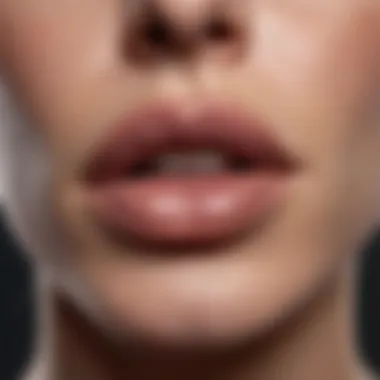What to Do If Your Lips Are Peeling: A Comprehensive Guide


Intro
Peeling lips is a common affliction that many people experience at some point in their lives. Causes can vary widely, from environmental factors like dry weather to personal habits such as lip licking. Understanding the reasons behind peeling lips can help individuals find effective methods to prevent and treat this often frustrating condition.
In this guide, we will explore the anatomy of the lips, potential causes of peeling, and various remedies. Addressing this issue requires a multi-faceted approach. We will discuss lifestyle changes, home remedies, skincare routines, and indicators of when professional help is necessary.
By the end of this overview, readers should feel empowered to take action against peeling lips and enhance their lip health.
Possible Causes of Peeling Lips
Environmental Factors
The environment plays a significant role in lip health. Exposure to harsh winds, sun, and cold temperatures can lead to dryness, making lips more susceptible to peeling. Indoor heating or air conditioning can also dry out the air, contributing to the problem.
Personal Habits
Some people may unconsciously lick their lips or bite them, which can worsen peeling. Dehydration and inadequate water intake can lead to dryness, exacerbate the problem, and diminish overall lip appearance.
Allergens and Irritants
Certain skincare products or even food can cause allergic reactions, leading to peeling. Ingredients like fragrances and preservatives in lip balm or cosmetic products can irritate sensitive lips. Identifying and avoiding these triggers is critical for maintaining lip health.
Remedies for Peeling Lips
Lifestyle Changes
To combat peeling lips, start with hydration. Drinking sufficient water every day keeps the body and lips hydrated. Additionally, consider using a humidifier in dry environments.
Home Remedies
Many home remedies can alleviate peeling lips. For example, applying natural oils like coconut or almond oil can provide nourishment. Honey is another remedy; it has natural moisturizing properties that can help treat peeling.
"Natural remedies can be a gentle and effective way to heal peeling lips."
Skincare Routines
A consistent skincare routine is crucial. Use soft lip scrubs containing sugar or gentle exfoliants occasionally. This can remove dead skin and promote healthier lips. Apply a thick lip balm regularly, especially before going to bed, to lock in moisture.
When to Seek Professional Advice
If peeling persists despite home treatment, it may be wise to consult a dermatologist. Persistent peeling can be a sign of underlying conditions like eczema or fungal infections. A professional can provide tailored advice and treatment options suited to the individual's needs.
Understanding Peeling Lips
Understanding the issue of peeling lips is crucial for anyone seeking to maintain a polished appearance and promote overall lip health. For individuals who pay attention to aesthetics, the condition of the lips often reflects broader aspects of personal grooming. Addressing peeling lips effectively requires knowledge of underlying causes, potential remedies, and lifestyle modifications that can enhance lip health.
A deep dive into the anatomy of the lips, as well as the main culprits behind peeling, sets the stage for better self-care practices. With a solid understanding, one can take informed actions that may prevent this problem from recurring.
Additionally, awareness of common conditions causing lip peeling can lead to early intervention. This knowledge empowers individuals to recognize when to adopt basic home remedies and when professional help might be necessary. Such comprehension is not just beneficial but essential for a holistic approach to personal style and health.
Anatomy of the Lips
The lips consist of multiple layers of skin, shaped by a delicate balance of moisture and protection. The outer layer is often more prone to environmental influences, making it susceptible to damage and peeling. Key components include:
- Epidermis: This thin outer layer is the most affected by weather conditions and irritants.
- Dermis: Beneath the epidermis, this layer provides structural support and contains blood vessels and nerve endings.
- Mucosal Membrane: This inner layer stays moist and facilitates the movement of the lips, playing a role in speech and expression.
Understanding these layers highlights why certain factors, such as dehydration or harsh weather, can lead to peeling. They also indicate that restoring lip health requires attention to both external care and internal condition, like hydration levels.


What Causes Lips to Peel?
Peeling lips can result from a myriad of causes, each worth consideration. Here are several primary factors contributing to the condition:
- Environmental Factors: Low humidity, cold temperatures, and sun exposure can draw moisture from the lips, leading to dryness.
- Hydration: Insufficient water intake affects skin elasticity and moisture retention, impacting lip health negatively.
- Diet: Deficiencies in vitamins, especially B vitamins and omega fatty acids, can trigger peeling.
- Allergic Reactions: Certain cosmetics or lip products can cause reactions, resulting in dry, peeling skin.
- Medical Conditions: Conditions like eczema or psoriasis can affect lip integrity, leading to peeling skin.
- Habits: Habits like licking the lips can exacerbate the issue, stripping natural oils and leading to irritation.
It's crucial to identify the specific cause behind peeling lips to implement effective treatments, whether they are lifestyle changes, dietary adjustments, or skincare solutions. These insights aid not just in immediate relief, but in long-term maintenance of lip health.
Environmental Factors Contributing to Lip Health
Understanding the environmental factors that affect lip health is crucial for preventing and treating peeling. Our lips are sensitive and vulnerable to various external influences, which can lead to discomfort and aesthetic concerns. Numerous reasons exist for addressing environmental challenges, ranging from avoiding unnecessary irritation to maintaining the overall elasticity and appearance of the lips.
By recognizing these factors, readers can adopt informed strategies to protect their lips, ensuring optimal health and minimizing the risk of peeling.
Climate and Weather Effects
Temperatures and weather conditions play a significant role in lip health. Extreme temperatures, whether frigid winters or scorching summers, can lead to drying and peeling of the lips. Winter conditions often bring about low humidity levels, which exacerbate moisture loss. This can result in chapped lips that require immediate attention. Conversely, excessive heat can lead to sunburn on the lips, causing irritation and discomfort.
A few considerations include:
- Cold weather: Using a thick balm can create a barrier against the cold air.
- Hot sun: Wearing a lip product with SPF can protect against harmful UV rays.
- Humidity levels: High humidity may lessen lip dryness but can lead to different forms of irritation.
In addition, wind can also contribute to peeling as it strips away moisture. Be aware of the climate in your area and adjust your lip care accordingly.
Impact of Air Quality
The quality of air around us has a direct connection to our skin and lip health. Urban pollution, allergens, and smoke exposure can damage the lip's delicate skin barrier. Pollutants can cause inflammation, leading to a range of conditions that may manifest as peeling or cracked lips. Allergens present in the air may also provoke allergic reactions, worsening the condition.
To mitigate these effects, consider the following steps:
- Stay indoors on high pollution days: Protect lips from pollutants.
- Use air purifiers: Improving indoor air quality can reduce irritants.
- Hydration: Drinking plenty of water remains crucial; it supports overall moisture levels in the body.
By staying aware of environmental conditions and their effects, individuals can take practical measures to ensure their lips remain healthy and free from peeling.
Lifestyle Choices Influencing Lip Condition
Lifestyle choices play a significant role in the overall health and appearance of your lips. Understanding how different habits, dietary patterns, and environmental exposures affect lip condition can help you make informed decisions. A proactive approach to lip care not only enhances beauty but also prevents peeling and chapping.
Diet and Hydration
Diet directly influences skin health, including your lips. Foods rich in vitamins and antioxidants promote skin repair and hydration.
Essential nutrients include:
- Vitamin C: Found in fruits like oranges, strawberries, and kiwis. It aids in collagen production.
- Vitamin E: Present in nuts and seeds, it helps maintain skin moisture.
- Omega-3 fatty acids: Found in fish like salmon and in flaxseeds, these fats are crucial for skin hydration.
Hydration is equally vital for lip health. Dehydrated skin can lead to increased peeling. Aim to drink sufficient water daily; around 8 cups is a good baseline to start from. Also, you can incorporate foods with high water content, such as cucumbers and watermelons, into your diet. This combination of solid hydration and nutrient-rich foods creates a strong defense against lip peeling.
Smoking and Its Effects
Smoking has adverse effects on the entire body, lips included. Tobacco and nicotine can lead to dryness, discoloration, and increased peeling. Moreover, smoking affects blood circulation, which deprives the lips of essential nutrients and slows down the healing process. The repeated motion of inhaling smoke can also cause irritation and chapping.
Consider the following points regarding smoking and lip health:
- Dryness: Smoking can dry out the moisture barrier in the lips, leading to flakes and cracks.
- Discoloration: Prolonged smoking can lead to darker pigmentation on the lips, altering their natural color.
- Increased Sensitivity: Smokers may find their lips becoming more sensitive to environmental factors such as sun exposure or cold weather.
Finally, it is essential to recognize the long-term effects and health risks associated with smoking. Quitting or reducing smoking not only improves lip condition but also has broader health benefits. The results can be visible after some time, allowing your lips to regain their vibrancy and suppleness.


Common Skin Conditions Affecting the Lips
Understanding the various skin conditions that can affect the lips is essential for maintaining overall lip health. The lips, though a small part of our anatomy, are often vulnerable to an array of issues. Factors such as the environment, lifestyle choices, and underlying health conditions can contribute to these problems.
By recognizing common skin conditions such as chapped lips, allergic reactions, and infections, you can take proactive steps to manage or avoid them. This section delves into these conditions and their implications, providing valuable insights for maintaining healthy lips.
Chapped Lips
Chapped lips are perhaps the most common issue encountered. This condition arises when the skin on the lips becomes dry, cracked, or flaky. Environmental factors like cold weather, low humidity, or excessive sun exposure can significantly worsen the condition.
Symptoms may include:
- Redness and irritation
- Flaking or peeling skin
- A sensation of tightness
Chapped lips can be quite uncomfortable and can lead to more serious conditions if not treated properly. It is important to identify triggers and address them enefit of using moisturizers or ointments regularly to keep the lip skin hydrated.
Allergic Reactions
Allergic reactions can manifest on the lips and are often caused by substances that come into contact with the skin, such as certain lip balms, cosmetics, or even foods. Symptoms of an allergic reaction may include:
- Swelling
- Rash or hives
- Itching
When lips react negatively to a product or substance, discontinuing the use of the irritant is crucial. Consulting a healthcare professional can help determine the exact cause and guide you on suitable alternatives. Avoiding allergens is key to preventing future incidents.
Infections and Their Impacts
Infections can also affect the lips, leading to complications if not treated promptly. Two common types include herpes simplex virus, which causes cold sores, and fungal infections. Signs of infection may consist of:
- Blisters that may burst
- Discomfort or pain
Proper hygiene practices are vital for preventing lip infections. If an infection is suspected, seeking medical advice is crucial to receive appropriate treatment. Many cases of lip infections can be managed effectively with medication; however, understanding the symptoms is the first step to appropriate action.
"The health of our lips is often overlooked, yet they serve as a barrier and reflect our overall skin condition."
By recognizing these common skin conditions affecting the lips, you can adopt a more informed approach to your lip care. This not only helps in treating existing conditions but also in taking preventative measures to avoid future problems.
Preventive Measures for Healthy Lips
Preventive measures play a vital role when it comes to maintaining the health of your lips. Lips are delicate. They lack oil glands, making them prone to dryness and peeling. It is crucial to adopt consistent habits that protect and nourish this sensitive area. Ensuring lip health not only improves appearance but also enhances comfort. Here, we highlight key techniques that can make a real difference.
Moisturization Techniques
Proper moisturization is essential for preventing peeling lips. This involves using products that provide hydration and lock in moisture. There are several options available:
- Lip Balms: Choose lip balms with natural ingredients. Look for those containing shea butter, beeswax, or coconut oil. These ingredients offer deep hydration and create a protective barrier against the elements.
- Natural Oils: Oils like almond oil or jojoba oil are excellent for lip care. They penetrate deeply and provide lasting moisture. Apply a small amount regularly, especially before sleeping.
- Humidifiers: In dry environments, using a humidifier at home or in the office can enhance moisture in the air. This helps maintain hydration levels in your lips and skin.
Regular application of these products can prevent dryness and maintain the softness of your lips.
Sunscreen Application
Sunscreen for your lips is often overlooked yet extremely important. Lips are vulnerable to sun exposure, which can lead to damage, peeling, and even increase the risk of skin cancer. Here’s how to apply and choose the right protection:
- SPF Lip Balm: Look for a lip balm with an SPF of at least 15. Ingredients like zinc oxide or titanium dioxide offer good protection. Apply it whenever you are outdoors.
- Reapply Often: Sunscreen needs reapplication approximately every two hours, especially if you're sweating or eating. Keep a product handy for easy access.
- Protective Clothing: Wearing a wide-brimmed hat can also shield your lips from direct sun exposure.
"Incorporating sunscreen into your lip care routine is as vital as moisturizing. It protects against both UV damage and peeling."
By maintaining a regular routine of moisturization and diligent sunscreen application, you can significantly enhance the health and appearance of your lips. These preventive measures not only protect against environmental stressors but also lay the foundation for a radiant smile.


Effective Remedies for Peeling Lips
Dealing with peeling lips can be uncomfortable and sometimes embarrassing. Knowing effective remedies is crucial because it can facilitate not only relief but also restoration of lip health. The right approach can minimize peeling and enhance overall comfort. It’s essential to address both immediate care and long-term solutions. Remedies fall into several categories, ranging from home solutions to personal care products that are specifically designed for lip health.
Home Remedies
Home remedies offer accessible and often natural options for treating peeling lips. Here are some practical methods you can try:
- Coconut Oil: This oil is highly moisturizing. Apply it directly to your lips to provide a protective barrier against moisture loss.
- Honey: Its natural humectant properties can draw moisture into the lips. You can dab some honey on your lips for soothing nourishment.
- Aloe Vera: Known for its healing properties, aloe vera gel can help reduce irritation and hydrate the lips. Use fresh gel for best results.
- Exfoliation: A gentle scrub can remove dead skin cells. You might mix sugar with olive oil and use it sparingly once a week.
- Cucumber slices: Placing cucumber slices on the lips can soothe and hydrate due to its high water content.
These home remedies are easy to incorporate into your daily routine. It is crucial to be patient and consistent, as most natural treatments take time to show results. Moreover, it is prudent to patch test any ingredient to check for allergic reactions.
Personal Care Products
Various personal care products are available in the market that targets lip health specifically. Users should prioritize products free from harsh chemicals to minimize irritation. Here are some types of products to consider:
- Lip Balms: Look for balms with ingredients like shea butter, beeswax, or vitamin E. These compounds effectively seal moisture in and prevent the lips from drying out.
- Lip Masks: These overnight treatments are designed to deeply moisturize. They can be an excellent addition to your skincare routine, especially during extreme weather.
- Exfoliating Lip Scrubs: These scrubs not only help to eliminate dry skin but often include hydrating ingredients that refresh the lips post-exfoliation.
- Sunscreen Lip Products: Given that sun exposure can worsen peeling, using a lip product with SPF is essential for protection from UV rays.
Be cautious with products that contain fragrances or flavors, as they may exacerbate peeling in some individuals. Always check the ingredient list and choose formulations that prioritize hydration and repair.
Effective care of your lips is not just about dealing with problems as they arise; it’s also about preventing issues before they start.
When to Seek Professional Help
Peeling lips can often be attributed to common factors such as dehydration, weather variations, or even personal habits. However, in some instances, this condition may signify a more serious underlying issue. Recognizing when to seek professional help is crucial not only for effective treatment but also for maintaining overall lip health. Prompt intervention can lead to better outcomes and prevent long-term complications.
Identifying Severe Symptoms
Some symptoms may indicate that the issue is beyond simple dryness or irritation. It is essential to identify these signs early. Severe symptoms include:
- Persistent peeling that does not improve with over-the-counter treatments.
- Cracks or fissures in the lips that bleed or become painful.
- Swelling or inflammation that lasts several days.
- Discoloration or changes in the color of the lips.
- Signs of infections, such as pus or fever.
If any of these symptoms arise, it is advisable to consult a healthcare professional. The presence of these indicators may suggest conditions that require specialized treatment, such as infections, autoimmune diseases, or nutrient deficiencies.
Consultation with a Dermatologist
A consultation with a dermatologist can provide insight into the specific causes of peeling lips. By examining your lips and taking a detailed medical history, the dermatologist can identify whether there are any underlying health concerns.
During the appointment, it is helpful to provide information about:
- Recent changes in your diet or lifestyle.
- Other symptoms you may be experiencing on the skin or elsewhere.
- Personal care products and medications currently being used.
The dermatologist may conduct skin tests or recommend treatments tailored to your needs. Potential treatment options may include topical ointments, prescribed medications, or lifestyle adjustments that address both the symptoms and any underlying issues.
Seeking professional guidance is a proactive step that can enhance your approach to lip care, preventing future complications.
Overall, while self-care measures are valuable, understanding when to consult a specialist ensures that more serious conditions do not go unaddressed. Taking these steps can promote not only better lip health but also overall well-being.
The End and Future Considerations
In any discussion about lip care, it is crucial to recognize the significance of understanding and addressing the underlying causes of peeling lips. This article has laid out a comprehensive overview of the factors and remedies associated with this common condition. A holistic approach encompasses recognizing both environmental triggers and personal habits that affect lip health. The importance of consistency in care cannot be overstated. Adopting a routine that integrates moisturization, sun protection, and healthy lifestyle choices will mitigate the risk of future issues.
Looking forward, maintaining optimal lip health involves remaining aware of changes in your environment and adapting your care strategies accordingly. As you gain knowledge on this topic, the emphasis should be placed on proactive measures and early intervention if symptoms arise.
Recap of Key Points
- Understanding Causes: Various causes can lead to peeling lips, including environmental factors, dietary habits, and skin conditions.
- Preventive Measures: Regular moisturization and using sunscreen are essential practices for maintaining lip health.
- Remedies: Home remedies and personal care products can significantly alleviate the symptoms of peeling lips.
- Professional Guidance: Knowing when to consult a dermatologist is vital to avoid serious skin conditions.
Maintaining Lip Health Moving Forward
To ensure continued lip health, consider the following strategies:
- Hydrate: Drink plenty of water to keep your lips and body well-hydrated.
- Nutrition: Incorporate vitamin-rich foods into your diet, especially those high in vitamin E and C, which promote skin health.
- Avoid Irritants: Refrain from using lip products or cosmetics that may contain harsh chemicals.
- Regular Check-ups: Schedule routine visits with a dermatologist to monitor any changes in your skin and lips.
By embracing a well-rounded approach to lip care, you can significantly enhance your overall appearance and comfort. Continue to educate yourself on lip health, adapting your routines as necessary for optimal results.















